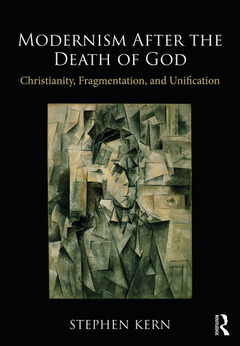Modernism After the Death of God Christianity, Fragmentation, and Unification
Auteur : Kern Stephen

Modernism After the Death of God explores the work of seven influential modernists. Friedrich Nietzsche, James Joyce, D. H. Lawrence, André Gide, and Martin Heidegger criticized the destructive impact that they believed Christian sexual morality had had or threatened to have on their love life. Although not a Christian, Freud criticized the negative effect that Christian sexual morality had on his clinical subjects and on Western civilization, while Virginia Woolf condemned how her society was sanctioned by a patriarchal Christian authority. All seven worked to replace the loss or absence of Christian unity with non-Christian unifying projects in their respective fields of philosophy, psychiatry, or literature. The basic structure of their main contributions to modernist culture was a dynamic interaction of radical fragmentation necessitating radical unification that was always in process and never complete.
Introduction: From Christian unity to modernist unification
Chapter 1. Friedrich Nietzsche: greatness, meaning, and authenticity
Chapter 2. James Joyce: wholeness, harmony, and radiance
Chapter 3. Sigmund Freud: psychoanalysis and psychosynthesis
Chapter 4. D. H. Lawrence: spontaneous-creative fullness of being
Chapter 5. André Gide: wholly available to life and love
Chapter 6. Martin Heidegger: pursuing the question of Being
Chapter 7. Virginia Woolf: creating shape out of chaos
Conclusion: A modernist ideal type
Stephen Kern is a Humanities Distinguished Professor in the Department of History at Ohio State University. His publications include The Culture of Time and Space 1880–1918 (1983); The Culture of Love: Victorians to Moderns (1992); A Cultural History of Causality: Science, Murder Novels, and Systems of Thought (2004), and The Modernist Novel: A Critical Introduction (2011).
Date de parution : 11-2017
17.8x25.4 cm
Date de parution : 11-2017
17.8x25.4 cm
Thèmes de Modernism After the Death of God :
Mots-clés :
Young Man; modernism; Christian Sexual Morality; masculinity; Belvedere College; sexuality; Modernist Ideal Type; religion; Catholic Sexual Morality; Christianity; Sergei Pankejeff; Nietzsche; Molly’s Speech; James Joyce; Lady Chatterley’s Lover; Freud; Vice Versa; D; H; Lawrence; Philippson Bible; André Gide; Globed Compacted Things; Martin Heidegger; Spoke Zarathustra; Virginia Woolf; Christ Child; Max Weber; Courageous Sincerity; Christian education; Ascetic Priests; morality; Rachel Vinrace; philosophy; Existential Unification; psychology; Ancient Greece; Oedipus; Otto Von Bismarck; chastity; Jacob’s Son; anti-Christianity; Sexual Evolution; Lutheran; Classic Oedipus Complex; Jesuit; Woolf’s Life; homosexuality; Daniel Schreber; ambivalence; Fragmenting Technique



